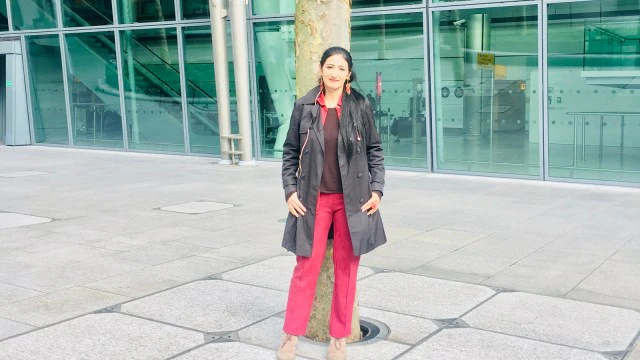
Officials claim that Kaul's writings and speeches actively challenge India's institutions (photo source X)
The cancellation of Nitasha Kaul’s OCI status has triggered intense political and social debates, exposing deep divisions within India’s intellectual and ideological landscape. The decision, framed by the government as a national security measure, has sparked contrasting viewpoints from policy makers, nationalist groups, activists, and academics, each interpreting the move through their own lens of patriotism, dissent, and transnational repression.
Table of Contents
Government’s Justification: Protecting National Interests
The Indian government, through its official communication, has defended its decision, citing Kaul’s alleged anti-India rhetoric as grounds for revoking her OCI status. Authorities argue that foreign individuals of Indian origin should not be allowed to spread misinformation or work against India’s sovereignty while benefiting from special OCI privileges.
Government officials highlight key points in their defense:
- Threat to National Security: The revocation is framed as a necessary action to prevent individuals from undermining India’s territorial integrity or destabilizing its global image.
- Misuse of OCI Benefits: Officials claim that Kaul’s writings and speeches actively challenge India’s institutions, and thus, she should no longer hold the legal advantages afforded to OCI cardholders.
- Setting a Precedent: This decision sends a strong warning to overseas critics, indicating that OCI status is not a shield for those who propagate narratives detrimental to India.
Nationalist Support: Defending Sovereignty and Cultural Pride
Nationalist groups and right-wing political commentators have largely supported the government’s move, asserting that individuals engaging in “anti-India propaganda” should not enjoy the benefits of OCI. They argue that India’s approach aligns with the global trend of nations protecting their image and sovereignty against foreign critics.
Their stance includes:
- OCI is a privilege, not a right: Unlike full citizenship, OCI holders must uphold India’s interests and reputation.
- Western biases in academia: Many nationalist voices believe that overseas scholars and journalists often misrepresent India, focusing disproportionately on controversial topics such as Kashmir, caste politics, and religious divides.
- Stronger enforcement against dissenters: Some call for stricter regulations on OCI holders engaging in activism against India, warning that unchecked intellectual dissent could be weaponized by foreign entities.
Criticism from Academics and Activists: A Blow to Free Speech
On the opposing side, human rights groups, academics, and activists see Kaul’s OCI cancellation as an alarming precedent for academic freedom and dissent suppression. They argue that India’s recent trend of curbing critics—both domestic and overseas—reflects a broader democratic backslide.
Key concerns raised by critics include:
- Transnational Repression: Many view India’s actions as an attempt to silence overseas intellectuals, drawing parallels with China, Russia, and Turkey, where governments have revoked citizenships, restricted entry, or even persecuted dissidents abroad.
- Threat to Global Academic Engagement: Scholars fear that revoking OCI status based on critical writings could discourage international discourse on India’s socio-political challenges.
- Selective Punishment of Critics: Activists argue that the government does not target individuals supportive of India’s policies, even if they are politically active overseas—suggesting selective enforcement against critics.
Social Media Backlash: Public Outrage vs. Nationalist Endorsements
Kaul’s revelation on social media triggered an immediate storm of reactions, both in support and opposition. Her tweet calling the cancellation a “vindictive example of transnational repression” was met with hundreds of retweets and comments, fueling intense debate across platforms like Twitter, Reddit, and Facebook.
Trending Hashtags Reflect the Divide
- #StopTransnationalRepression – Used by critics defending Kaul, arguing that India is restricting intellectual freedom.
- #IndiaFirst – Nationalists using the hashtag to endorse India’s move, calling for stronger action against individuals undermining national sovereignty.
- #AcademicFreedom – Scholars raising concerns over India’s global reputation in higher education following this decision.
Kaul’s cancellation has also drawn international reactions, particularly from academic communities in the UK and the US, who see the move as a discouraging sign for scholars engaging in research about India.
Potential Consequences: Will More Critics Face Revocation?
The decision raises an important question -will India continue revoking OCI status for other overseas critics? Some analysts warn that this could set a dangerous precedent, where dissenters, journalists, and activists lose their access to India based on political opinions.
Possible consequences include:
- Chilling Effect on Scholars: Academics may hesitate to publish critical research on India, fearing legal or travel repercussions.
- Strained Relations with Indian Diaspora: Many overseas Indians may see this move as an erosion of their connection to India, especially those involved in human rights or policy advocacy.
- Legal Challenges: Kaul or others in similar situations may pursue legal action, appealing to international human rights organizations.
Conclusion on Political and social reactions
The revocation of Nitasha Kaul’s OCI status has ignited a wider debate about nationalism, academic freedom, and the role of dissent in India’s evolving political landscape. While the government defends its decision as a necessary action to protect India’s sovereignty, critics argue that it reflects increasing intolerance toward opposing viewpoints.
This event is likely to have long-term implications, especially concerning India’s global academic reputation and relations with its diaspora. Whether this marks an isolated case or a broader trend remains to be seen, but it has certainly intensified conversations about the future of free speech in India and abroad.
2 thoughts on “Political and Social Reactions- A Divisive Debate on Dissent and Nationalism”